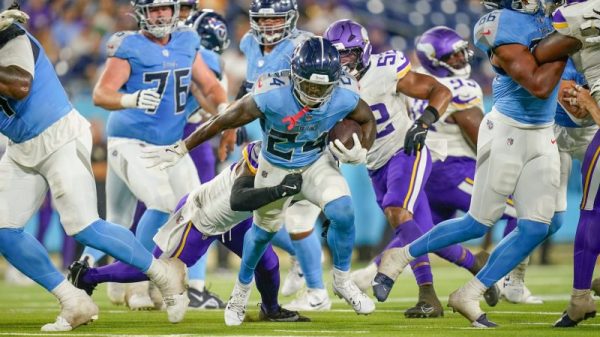
- Serena Williams’ recent weight loss and comments about GLP-1 drugs raise questions about their potential use as performance enhancers in sports.
- While not currently banned by WADA, semaglutide, a GLP-1 receptor agonist, is being monitored for potential performance-enhancing effects.
- USADA has not found widespread GLP-1 use among athletes, but anecdotal reports suggest potential use in weight-sensitive endurance sports.
But something else she said may cause ripples in the sports world.
The legendary tennis player who won 23 Grand Slam titles suggested she might have fared even better if she’d been taking the injectable weight-loss medication that includes brand names such as Ozempic, Wegovy and Zebound.
‘I had a lot of knee issues,’ Williams, 43, told Today.com ‘Especially after I had my kid (and) was never able to get to my normal levels of weight. And that, quite frankly, definitely had an effect on maybe some wins that I could have had in my career.’
That raises a question: is GLP-1 a performance-enhancing drug?
The weight-loss drugs are not banned by World Anti-Doping Agency, which creates and enforces anti-doping rules for the Olympics. But semaglutide, a GLP-1 androgen receptor, is in WADA’s monitoring program.
The goal is to “track patterns of use in and out of competition,’’ James Fitzgerald, head of media relations for WADA, told USA TODAY Sports.
“Everyone is using GLP-1s!’’ Oliver Catlin, president of Anti-Doping Sciences Institute & Banned Substances Control Group, told USA TODAY Sports by email. “Of course athletes are using them.’’
Matthew Fedoruk, the Chief Science Officer at the U.S. Anti-Doping Agency, said there are reports that GLP-1 androgen receptors have been used in weight-sensitive endurance sports like the triathlon. But not at the elite level, he added.
The potential drawback
Photos of Williams after her weight loss show she’s still muscular. But USADA’s Fedoruk said a side effect of GLP-1 androgen receptors is loss of muscle mass.
“So obviously that’s not a great a great outcome for an elite level athlete,’’ he said.
A couple of clinical trials show muscle loss can be prevented when GLP-1s are paired with substances such as Selective Androgen Receptor Modulators (SARMs), according to Fedoruk. But he pointed out those substances are banned by WADA.
He also said more research to understand the potential risks in healthy individuals such as athletes “would be worthwhile.’’
USADA, the national anti-doping organization, has seen no evidence of rampant use of GLP-1s by athletes, according to Fedoruk. He said of the thousands of sample collections USADA has taken over the past five years, only 29 athletes have acknowledged through declarations they were taking the drug.
He also said the statistics didn’t show any increase in detection for athletes in specific sports.
But as the use of GLP-1s has exploded in popularity, Fedoruk said, USADA has heard anecdotal reports of the drug being used for weight-sensitive endurance sports.
“I don’t know if that’s going to be mean that they’ll find their way into the elite level,’’ he said, adding that he’s concerned about the side effect of the loss of muscle mass.
Athletes are really using GLP-1s?
Current Olympians could not be immediately reached to address whether GLP-1s – designed primarily to treat type 2 diabetes — are being used to enhance athletic performance.
Gary Hall Jr., the retired Olympic swimmer who won 10 medals while competing in the 1996, 2000 and 2004 Games, told USA TODAY Sports, “This is the first I’m hearing of it, and I follow both diabetes and swimming.’’ But he also said, “If it provides an advantage, there are bad players who will abuse it.’’
Kara Goucher, an American long-distance runner who competed at the 2008 and 2012 Olympics, said she has not heard about the use of GLP-1s by athletes. But she said she does know a couple of people taking it who were not elite athletes – and they both suffered from lightheadedness and stomach distress.
“So I don’t know how you could do that and train as an elite,’’ Goucher said by text message.
But when it comes to the potential benefits of the medication, USADA’s Fedoruk said, “The jury is still out. It hasn’t been monitored for that long, so I think it’s worth continuing to monitor.’’





























